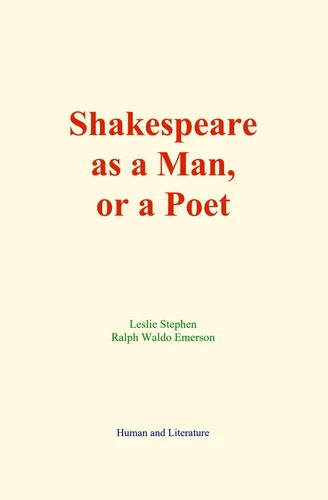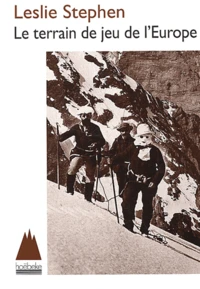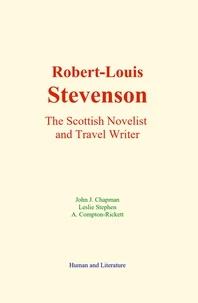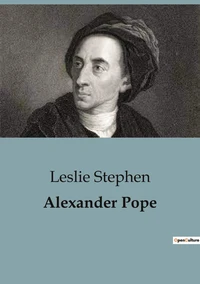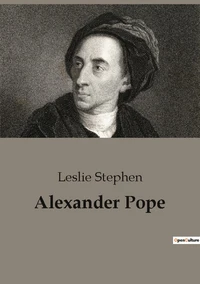Shakespeare as a Man, or a Poet
Par : ,Formats :
Disponible dans votre compte client Decitre ou Furet du Nord dès validation de votre commande. Le format Multi-format est :
- Pour les liseuses autres que Vivlio, vous devez utiliser le logiciel Adobe Digital Edition. Non compatible avec la lecture sur les liseuses Kindle, Remarkable et Sony
 , qui est-ce ?
, qui est-ce ?Notre partenaire de plateforme de lecture numérique où vous retrouverez l'ensemble de vos ebooks gratuitement
Pour en savoir plus sur nos ebooks, consultez notre aide en ligne ici
- FormatMulti-format
- ISBN978-2-38626-400-9
- EAN9782386264009
- Date de parution14/11/2024
- Protection num.NC
- Infos supplémentairesMulti-format incluant ePub avec ...
- ÉditeurHuman and Literature Publishing
Résumé
Great men are more distinguished by range and tent than by originality. If we require the originality which consists in weaving, like a spider, their web from their own bowels; in finding clay and making bricks and building the house; no great men are original. Nor does valuable originality consist in unlikeness to other men. The hero is in the press of knights and the thick of events; and seeing what men want and sharing their desire, he adds the needful length of sight and of arm, to come at the desired point.
The greatest genius is the most indebted man. A poet is no rattle-brain, saying what comes uppermost, and, because he says everything, saying at last something good; but a heart in unison with his time and country. There is nothing whimsical and fantastic in his production, but sweet and sad earnest, freighted with the weightiest convictions and pointed with the most determined aim which any man or class knows of in his times...
Shakespeare's youth fell in a time when the English people were importunate for dramatic entertainments. The court took offence easily at political allusions and attempted to suppress them. The Puritans, a growing and energetic party, and the religious among the Anglican church, would suppress them. But the people wanted them. Inn-yards, houses without roofs, and extemporaneous enclosures at country fairs were the ready theatres of strolling players.
The people had tasted this new joy; and, as we could not hope to suppress newspapers now, - no, not by the strongest party, - neither then could king, prelate, or puritan, alone or united, suppress an organ which was ballad, epic, newspaper, caucus, lecture, Punch and library, at the same time.
The greatest genius is the most indebted man. A poet is no rattle-brain, saying what comes uppermost, and, because he says everything, saying at last something good; but a heart in unison with his time and country. There is nothing whimsical and fantastic in his production, but sweet and sad earnest, freighted with the weightiest convictions and pointed with the most determined aim which any man or class knows of in his times...
Shakespeare's youth fell in a time when the English people were importunate for dramatic entertainments. The court took offence easily at political allusions and attempted to suppress them. The Puritans, a growing and energetic party, and the religious among the Anglican church, would suppress them. But the people wanted them. Inn-yards, houses without roofs, and extemporaneous enclosures at country fairs were the ready theatres of strolling players.
The people had tasted this new joy; and, as we could not hope to suppress newspapers now, - no, not by the strongest party, - neither then could king, prelate, or puritan, alone or united, suppress an organ which was ballad, epic, newspaper, caucus, lecture, Punch and library, at the same time.
Great men are more distinguished by range and tent than by originality. If we require the originality which consists in weaving, like a spider, their web from their own bowels; in finding clay and making bricks and building the house; no great men are original. Nor does valuable originality consist in unlikeness to other men. The hero is in the press of knights and the thick of events; and seeing what men want and sharing their desire, he adds the needful length of sight and of arm, to come at the desired point.
The greatest genius is the most indebted man. A poet is no rattle-brain, saying what comes uppermost, and, because he says everything, saying at last something good; but a heart in unison with his time and country. There is nothing whimsical and fantastic in his production, but sweet and sad earnest, freighted with the weightiest convictions and pointed with the most determined aim which any man or class knows of in his times...
Shakespeare's youth fell in a time when the English people were importunate for dramatic entertainments. The court took offence easily at political allusions and attempted to suppress them. The Puritans, a growing and energetic party, and the religious among the Anglican church, would suppress them. But the people wanted them. Inn-yards, houses without roofs, and extemporaneous enclosures at country fairs were the ready theatres of strolling players.
The people had tasted this new joy; and, as we could not hope to suppress newspapers now, - no, not by the strongest party, - neither then could king, prelate, or puritan, alone or united, suppress an organ which was ballad, epic, newspaper, caucus, lecture, Punch and library, at the same time.
The greatest genius is the most indebted man. A poet is no rattle-brain, saying what comes uppermost, and, because he says everything, saying at last something good; but a heart in unison with his time and country. There is nothing whimsical and fantastic in his production, but sweet and sad earnest, freighted with the weightiest convictions and pointed with the most determined aim which any man or class knows of in his times...
Shakespeare's youth fell in a time when the English people were importunate for dramatic entertainments. The court took offence easily at political allusions and attempted to suppress them. The Puritans, a growing and energetic party, and the religious among the Anglican church, would suppress them. But the people wanted them. Inn-yards, houses without roofs, and extemporaneous enclosures at country fairs were the ready theatres of strolling players.
The people had tasted this new joy; and, as we could not hope to suppress newspapers now, - no, not by the strongest party, - neither then could king, prelate, or puritan, alone or united, suppress an organ which was ballad, epic, newspaper, caucus, lecture, Punch and library, at the same time.

